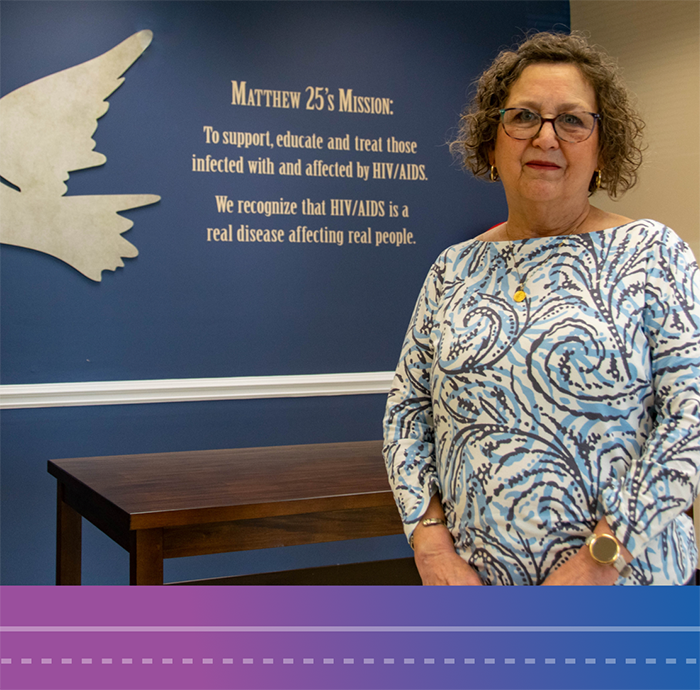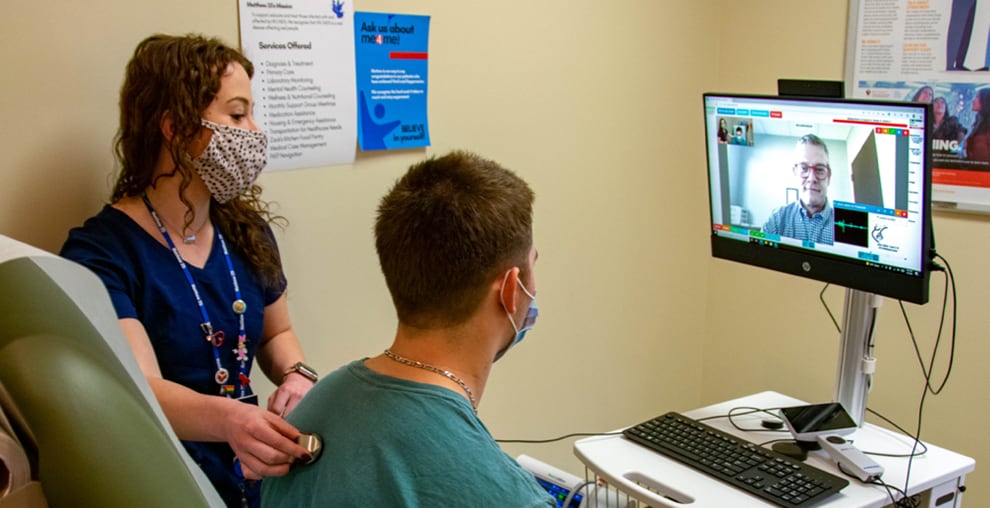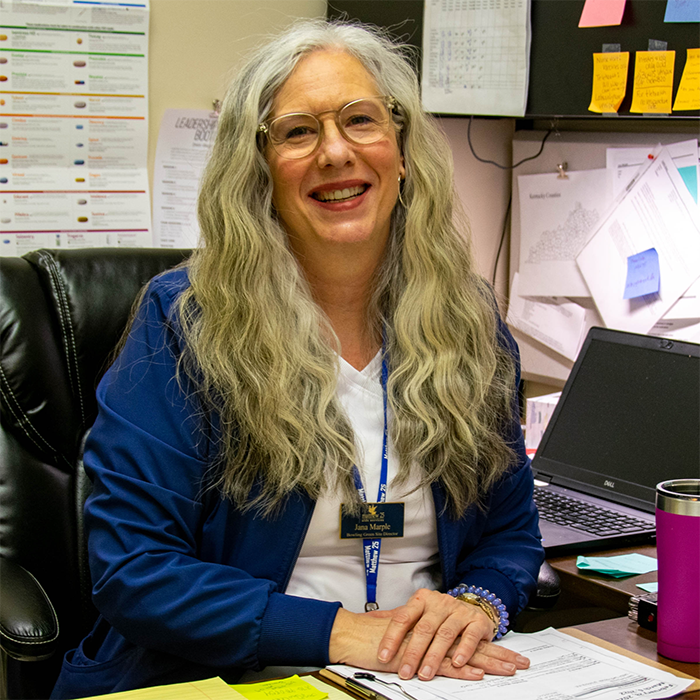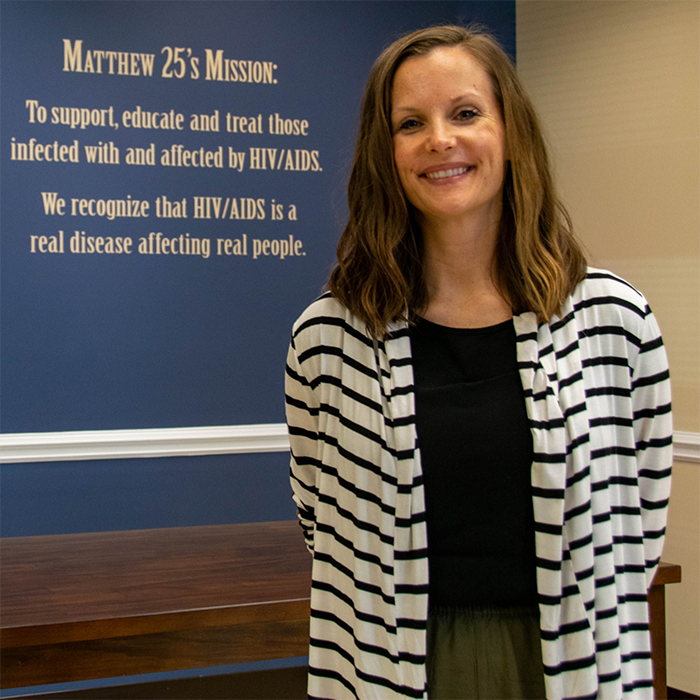
Matthew 25 AIDS Services: A Hybrid Telehealth Model That Allows for a “One-Stop Shop”
- Telehealth: A Lifeline to Treatment and Support for People with HIV in Kentucky
- LivWell Community Health Services: Maintaining vital connections to HIV providers through telehealth during COVID-19
- Matthew 25 AIDS Services: A Hybrid Telehealth Model That Allows for a “One-Stop Shop”
- Ushering In a New Era of Telehealth-Based HIV Services

Matthew 25 AIDS Services works with a variety of populations in Western Kentucky and Southern Indiana across four locations, including its headquarters in Henderson, KY and a satellite office in Bowling Green, KY. In 2020, Matthew 25’s Bowling Green satellite office had 123 active patients, approximately 43 percent of whom live at the federal poverty level.
Before COVID-19, the Bowling Green office provided care coordination services but did not provide medical care for its patients. That meant that Matthew 25 either transported patients from Bowling Green to its Henderson headquarters—about two hours away—to provide the medical care they needed, or referred them to Bowling Green’s lone infectious disease doctor. When the pandemic hit, however, that doctor passed away from COVID-19, and staff were no longer able to transport Bowling Green patients to Henderson.

“When we see needs our patients have, we try to step up and build services that meet their needs.”
– Cyndee Burton
Matthew 25 AIDS Services Founder and Administrator
Matthew 25 founder Cyndee Burton knew her team needed to create a solution to continue to serve those patients with medical care. Telehealth seemed like the best option, and staff quickly started mapping out a plan to implement a successful model that would serve their Bowling Green patients.
First, Burton and her team needed to identify a telehealth system that would meet their needs and be HIPAA-compliant. Then, their providers had to learn how to use the technology—and be convinced that they could provide the same level of care to their patients through a virtual system. Burton struck a hopeful, forward-looking tone with her staff.
“This thing [COVID] is going to go on and on, and you want to see these patients as much as I do,” Burton told her staff. “You know we’re going to have to do something different.”
After five months of planning, Matthew 25 launched their telehealth program. A hybrid in-person/telehealth model, patients arrive in-person at the Bowling Green clinic, where staff draw blood for labs and take vital signs. Then, staff virtually connect patients to an off-site provider at the organization’s Henderson or Owensboro locations. Matthew 25’s state-of-the-art telehealth equipment is sophisticated enough to enable remote examination of the lungs, heart, skin, and oral cavity.

Sarah Upchurch demonstrates how Matthew 25 uses a hybrid telehealth model to connect with a non-local provider.
As her team was launching the telehealth program, Burton says, she fielded calls from patients concerned about the privacy of conducting a medical examination through the internet. Since then, patients at the Bowling Green location have adapted well to the new hybrid model.
“We were able to say to them, ‘try it one time, and if you don’t like it, we’ll figure something out,” Burton says. “Pretty much everyone, once they’ve tried it, says they’re not going back.”
Because telehealth visits are completed at the clinic, patients do not need to be concerned with potential technological troubleshooting or related access issues. Additionally, when they enter the clinic for their telehealth appointment, they can also access the wraparound services vital to keeping them healthy—a “one-stop shop,” Burton says.
“Our supportive services make a difference—things like a food pantry and behavioral health,” Burton says. “People with HIV see we care about their basic needs. When we do that for them, they trust us for the rest of their health and HIV care. It’s a building block.”

Jana Marple, Site Director at Matthew 25 AIDS Services, helps patients access the clinic’s telehealth services to remain engaged in HIV care.

Sarah Phillips, Chief Clinical Officer at Matthew 25 AIDS Services, ensures people with HIV have access to the clinical and social services they need to stay healthy.
And patients can access all of these services—including medical care—without the long four-hour trip they would have endured to travel to and from Henderson.
Since the launch of their telehealth program in late 2020, Matthew 25 has successfully maintained its high standard of medical care for its Bowling Green patients. Staff are proud that, in large part because of their adopted telehealth model, 90% of Bowling Green’s active patients reached viral suppression in 2020. That number has increased in 2021 to 94%.
“I was really concerned with COVID—are people going to stop taking their meds?” Burton says. “We had that fear when we went into it. But thanks to telehealth, that hasn’t happened.”
Disclaimer: These stories do not represent endorsements by CDC of any organization or company mentioned.